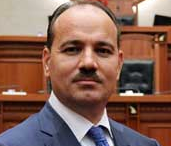Albania: Bujar Nishani Sworn In As President
By Besar Likmeta
To the sound of a 21-gun salute, former interior minister Bujar Nishani was sworn on Tuesday evening as Albania’s President.
In a speech in parliament after he had taken his oath, by placing his right hand on the constitution, Albania’s new President said his priority would be reform of the justice system.

“According to his constitutional duties, the President has an important role to play in the reform of the justice system,” Nisahni said, underlining the current lack of trust between judges and citizens.
Although Albania is a parliamentary democracy, the President plays a key role in the justice system by securing constitutional check and balances.
The President heads the High Council of Justice, the country’s highest judicial body, nominates the General Prosecutor and high court judges.
After the speech in parliament the inauguration ceremony was held at the presidential palace, where he met briefly with his predecessor, Bamir Topi.
Nishani was elected president with only the votes of the Albania’s ruling parties on June 11, after talks with opposition Socialists on reaching a consensus over a candidate collapsed.
Nishani, 46, has served twice in the cabinet of Prime Minister Sali Berisha, as Interior and Justice Minister.
Born in the city of Durres, he graduated from Tirana’s Military Academy in 1988. Before becoming Interior Minister in 2007 he held various positions in the Defence Ministry.
Nishani is the fifth president to be elected after the collapse of the Stalinist regime of former dictator Enver Hoxha in 1991.
